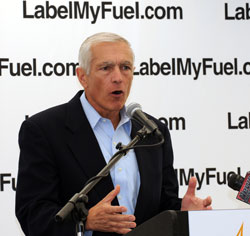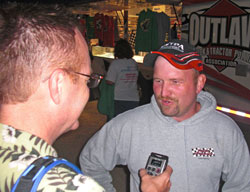 Gen. Wesley Clark, Growth Energy, made a major announcement this morning at the Farm Progress Show. The organization is calling for country of origin labeling for fuel. I would call that the “COOL for fuel” initiative! Hey, we do it with food, why not fuel?
Gen. Wesley Clark, Growth Energy, made a major announcement this morning at the Farm Progress Show. The organization is calling for country of origin labeling for fuel. I would call that the “COOL for fuel” initiative! Hey, we do it with food, why not fuel?
General Wesley Clark, Co-Chairman of Growth Energy, today called on the United States Congress and the White House to take action to dramatically enhance the market transparency of the nation’s fuel supply by requiring a national standard of country of origin labeling (COOL) for fuel.
The Label My Fuel initiative would create a COOL standard similar to requirements already in place for common consumer items, including apples, beef, cars and coffee. The goal is to help create consumer awareness of the costs and national security implications of the nation’s addiction to foreign oil.
Clark also unveiled Growth Energy’s labelmyfuel.com, which showcases the costs of American dependence on foreign oil, and serves to rally grassroots support for Congressional action on COOL for fuel legislation.
Farm Progress Show Photo Album
AgWired coverage of the 2009 Farm Progress Show
is sponsored by:  and
and 
You can listen to the press conference below:

 The first big news at the Farm Progress Show was the announcement by New Holland, our sponsor, of their new utility vehicle called
The first big news at the Farm Progress Show was the announcement by New Holland, our sponsor, of their new utility vehicle called 

 It’s that time. Time for the 2009 Farm Progress Show. I know a lot of people and a lot of work has been going on in Decatur, IL already and I’ll be on location tomorrow afternoon. Cindy and Carly will be going to their first FPS. It looks like they’ll have some great weather. That’ll be a change.
It’s that time. Time for the 2009 Farm Progress Show. I know a lot of people and a lot of work has been going on in Decatur, IL already and I’ll be on location tomorrow afternoon. Cindy and Carly will be going to their first FPS. It looks like they’ll have some great weather. That’ll be a change.
 To make their point in a pretty funny way, ALG released this
To make their point in a pretty funny way, ALG released this  What do you think of when you hear that there’s a sled running on biodiesel? Probably not thinking tractor pull sled are you? Unless you’re a tractor pull fan. Well those big machines that the tractors and trucks pull are also diesel powered and in Jefferson City, MO there’s a company that manufactures them and runs them on biodiesel.
What do you think of when you hear that there’s a sled running on biodiesel? Probably not thinking tractor pull sled are you? Unless you’re a tractor pull fan. Well those big machines that the tractors and trucks pull are also diesel powered and in Jefferson City, MO there’s a company that manufactures them and runs them on biodiesel. Donnie says they do over 160 shows a year around the country. At the Midwest Extreme Truck and Tractor Pull in Jefferson City he says they had two sleds in operation. He says they run B20 in them and have been for over 3 years very successfully. Donnie says they’ve had a lot of luck locating the fuel when they need it, especially at major truck stops.
Donnie says they do over 160 shows a year around the country. At the Midwest Extreme Truck and Tractor Pull in Jefferson City he says they had two sleds in operation. He says they run B20 in them and have been for over 3 years very successfully. Donnie says they’ve had a lot of luck locating the fuel when they need it, especially at major truck stops. This soybean grower from Missouri doesn’t plant corn with the machine he’s standing next too. No way. But he does power it with a biodiesel blend and compete in tractor pulls across the United States. He’s Dennis Shramek and one of the competitors in this weekend’s NTPA Midwest Extreme Truck and Tractor Pull. Thank you to the
This soybean grower from Missouri doesn’t plant corn with the machine he’s standing next too. No way. But he does power it with a biodiesel blend and compete in tractor pulls across the United States. He’s Dennis Shramek and one of the competitors in this weekend’s NTPA Midwest Extreme Truck and Tractor Pull. Thank you to the  John Deere has once again come out with a whole list of new product announcements. The big one is about their introduction of the
John Deere has once again come out with a whole list of new product announcements. The big one is about their introduction of the